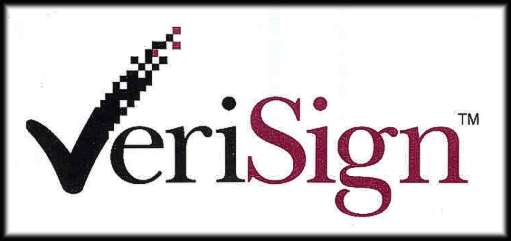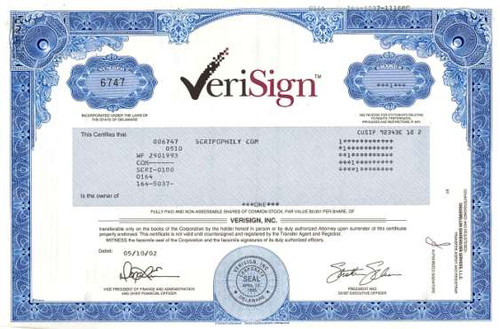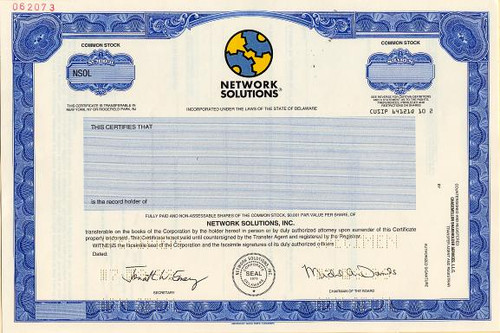Beautifully engraved Certificate from VeriSign . This historic document was printed by the United States Banknote Company and has an ornate border around it with a vignette of the company's logo. This item has the printed signatures of the company's officers. The company's stock reached over $240 a Share in March 2000. 
Certificate Vignette VeriSign, Inc. is a provider of digital trust services that enable businesses and consumers to engage in commerce and communications with confidence. The company provides digital trust products and services used to engage in secure electronic commerce and communications. VeriSign targets enterprises, service providers, telecommunications firms, and individuals, with offerings focused around three core areas: Web presence and trust services (more than half of sales), managed security and network services, and registry and telecommunications services. The company has used acquisitions to expand past its legacy encryption and digital certificate products into related fields, including domain name registration, wireless services, online transaction processing, and digital brand management. The company is embroiled in Class Action Suits regarding its Accounting Practices. The complaint charges VeriSign and certain of its officers and directors with violations of the Securities Exchange Act of 1934. The Company provides digital trust services that enable Web site owners, enterprises, communications service providers, e-commerce service providers and individuals to engage in secure digital commerce and communications. The complaint alleges that during the Class Period, defendants sought to artificially increase the Company's revenue and margins and to create the perception that its deferred revenue growth was derived organically. In fact, approximately 10% of the Company's revenue was derived from sales to small companies in which VeriSign had invested and from dubious "barter transactions." VeriSign's revenues and earnings derived from related parties were dubious at best. Specifically, whenever a two-way set of transactions occurs in which a company acts as both the lender and service provider, an investor laces assurance as to whether the related parties would have made similar decisions regarding purchases in the absence of financing from that company. Accordingly, despite the Company's claims that such transactions were separately negotiated and recorded at terms the Company considered to be at arm's length and fair value, the revenue and earnings that VeriSign recognized from its relationship with these customers was not an accurate measure of the "real" demand for VeriSign's products. Equally dubious was the quality of the non-monetary portion of revenue recorded from reciprocal agreements. As part of their effort to boost the price of VeriSign stock, defendants misrepresented VeriSign's true prospects in an effort to conceal VeriSign's improper acts until they were able to sell at least $26 million worth of their own VeriSign stock and use VeriSign's shares to acquire companies in stock- for-stock transactions. In order to overstate revenues and assets, VeriSign violated Generally Accepted Accounting Principles and SEC rules by, among other things, engaging in improper barter transactions and affiliate sales. These transactions had the effect of dramatically overstating the Company's margins and financial statements. On the Company's partial disclosures on April 25, 2002, the Company's shares plummeted by more than 50%.

Certificate Vignette








